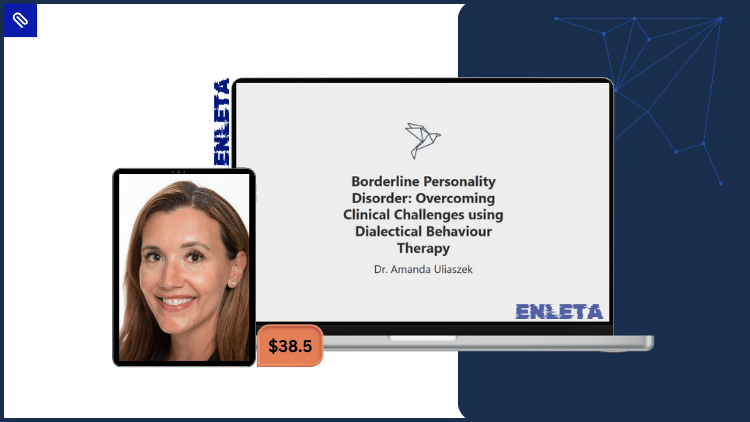Borderline Personality Disorder: Overcoming Clinical Challenges using Dialectical Behaviour Therapy by Dr. Amanda Uliaszek
Borderline Personality Disorder and Crisis Management is a workshop designed for clinicians and mental health professionals that focuses on assessing, understanding, and managing crisis behaviors in individuals with Borderline Personality Disorder (BPD). Led by Dr. Amanda A. Uliaszek, a respected psychologist and researcher specializing in emotion dysregulation and personality pathology, the course combines current research with practical clinical guidance.
Borderline Personality Disorder: Overcoming Clinical Challenges using Dialectical Behaviour Therapy Free Download – Includes Verified Content:
Borderline Personality Disorder: Overcoming Clinical Challenges using Dialectical Behaviour Therapy – Free Download Video Sample:
Borderline Personality Disorder: Overcoming Clinical Challenges using Dialectical Behaviour Therapy Free Download, Watch content proof here:
PDF Sample – Borderline Personality Disorder, watch here:
Borderline Personality Disorder – Overview of This Course
The curriculum begins by reviewing the clinical picture of BPD: symptoms, patterns of emotional instability, interpersonal dysregulation, and behavioral crises. It then explores myths, stigma, and treatment challenges commonly encountered when working with BPD clients. The course uses case examples to illustrate how crises emerge, particularly focusing on safety crises (such as suicidal behavior and self-injury) and relational crises (such as boundary violations and ruptures in therapeutic alliance).
A major component of the course is the introduction and integration of Dialectical Behavior Therapy (DBT) strategies. Participants learn how to adapt DBT skills to crisis contexts, how components of DBT skills group work can be used, and how to incorporate crisis management strategies into existing therapeutic practices. The learning material includes short video segments, downloadable slides, and real clinical examples.
Why Should You Choose This Course?
You should choose Borderline Personality Disorder and Crisis Management if you aim for long-tail professional outcomes such as “how to implement DBT skills to manage crises safely in BPD clients” or “how clinicians can reduce self-harm risk through validated therapy techniques.”
Many mental health practitioners feel uncertain when working with clients in crisis, especially when those crises are frequent or severe. Standard training often lacks specific guidance for relational ruptures or boundary violations, or how to respond to suicidal or self-injurious behavior in BPD ethically and effectively. This workshop fills that gap.
Another reason to choose this training is that Dr. Uliaszek brings both research credentials and clinical experience. Her leadership in the field of emotion dysregulation ensures that the methods taught are evidence-based, and that clinicians receive up-to-date practices informed by recent studies. This helps in managing not just the crisis moments but also improving long-term outcomes.
Moreover, this course addresses stigma and common misconceptions about BPD, offering validation and context so that clinicians can work with BPD clients with empathy, understanding, and confidence. If your long-term goals include “how to improve therapeutic alliance in BPD treatment” or “how to integrate DBT components in non-DBT settings”, this course provides practical tools and clinical strategies.
What You’ll Learn
By completing Borderline Personality Disorder and Crisis Management, you will develop both foundational knowledge and advanced clinical skills. Key learning outcomes include:
-
Recognition of Symptoms & Emotional Dysregulation
Identify heterogenous presentations of BPD: mood swings, impulsivity, identity disturbance, and interpersonal sensitivity. -
Understanding Crisis Behaviors
Term safety crises (self-injury, suicidal behavior) and relational crises (boundary violations, alliance ruptures), learning their functional roles in BPD. -
Addressing Myths and Stigma
Recognize and correct common misconceptions that may lead to therapeutic avoidance or client invalidation. -
Introduction to DBT vs. CBT
Understand differences between Dialectical Behavior Therapy and Cognitive Behavioral Therapy models in relation to BPD crisis behavior. -
DBT Skills Group Components
Learn how to use skills modules: distress tolerance, emotion regulation, interpersonal effectiveness, mindfulness in crisis contexts. -
Clinical Strategies for Crisis Integration
How to apply DBT tools during acute distress, strategies to intervene ethically, manage risk, and provide safety planning. -
Relational Repair and Boundary Work
Approaches to manage ruptures in therapeutic relationships, restore trust, and maintain professional boundaries. -
Safety Planning Protocols
Tools for assessing suicide risk, designing safety contracts, crisis intervention steps, and follow up. -
Case Studies & Examples
Analyze real-world clinical examples to observe how crisis behaviors manifest and how interventions succeed or fail. -
Support for Clinicians
Strategies to avoid burnout, maintain reflective practice, ensure emotional safety for therapists themselves.
These outcomes respond to long-tail needs such as “how to safely manage self-harm in BPD clients using DBT strategies” and “how to repair therapeutic relationships after boundary violations.”
Who Should Take This Course?
This course is ideal for:
-
Licensed psychologists, clinical social workers, psychiatrists, mental health counselors, and therapists who work with clients diagnosed with BPD or who frequently present crisis behaviors.
-
Professionals in training and postgraduate clinicians seeking to deepen their competence in managing client crises.
-
Clinicians who already use DBT or CBT and want to augment their approach with crisis management tools.
-
Mental health practitioners who wish to reduce stigma and increase validation in their clinical sessions with BPD clients.
-
Therapists encountering relational ruptures, boundary issues, or self-injury/self-harm in their practice and wanting clear, actionable strategies.
-
Anyone aiming for long-term goals such as “how to improve client safety with research-backed interventions” or “how to integrate crisis-focused DBT skills into everyday clinical work.”
Conclusion
Borderline Personality Disorder involves high emotional sensitivity, interpersonal instability, and skilled crisis‐management needs. Borderline Personality Disorder and Crisis Management equips clinicians with theoretical understanding, DBT-based strategies, and validation practices essential for effective care. By completing this course, you will gain long-term capabilities such as “how to assess and respond to BPD crisis behaviors safely”, “how to repair therapeutic alliance after relational ruptures”, and “how to integrate DBT skills into crisis intervention work with confidence and clarity.”
👍Enhance your clinical competence — enroll in Borderline Personality Disorder and Crisis Management today and transform your approach to crisis behaviors in BPD with evidence-based care.
👉Or you can try to find more options here











Reviews
There are no reviews yet.